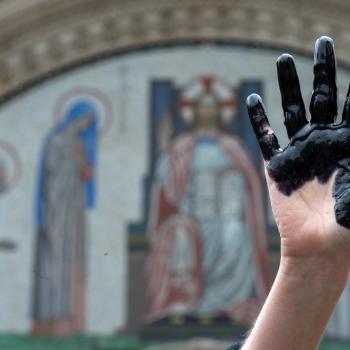
Economics should serve humanity, not humanity, economics. Those with economic privilege, those who have accumulated mass stockpiles of wealth, often try to justify their actions by saying what they did is allowed by our current economic system and so they did nothing wrong. But the system itself is flawed; it is founded upon and promotes various sins, especially avarice. Christians, once they see the root sin which lies behind the economic system currently in place, must confront the system, rejecting those who try to justify it as they would reject those who promoted some sort of carnal sin due to concupiscence.
The world is one, and as it is one, its resources should be shared by all. The needs of all can and should be met. When those who game the system disrupt the universal destination of goods by hoarding their wealth, their actions not only deserve condemnation, but their excessive goods must be shared with the world, distributed to those in need. Indeed, those who halt the free flow of goods by their avarice are responsible for the death and destruction which comes out of their greed. And it must be made clear: when necessities are not shared by those in need, people needlessly suffer and die. Thus, as Pope Francis and bishops in New Zealand understand, rejecting the common good leads to violations of the fifth commandment:
The natural environment is a collective good, the patrimony of all humanity and the responsibility of everyone. If we make something our own, it is only to administer it for the good of all. If we do not, we burden our consciences with the weight of having denied the existence of others. That is why the New Zealand bishops asked what the commandment “Thou shall not kill” means when “twenty percent of the world’s population consumes resources at a rate that robs the poor nations and future generations of what they need to survive”.[1]
For a free market to exist (and free markets must not be confused with capitalism, for capitalism ends up using economic advantages to stifle the free market), the universal destination of goods must be preserved and seen as the foundation for the market. That is, the market works when people work together in solidarity and promote distributive justice in and through that market economy; without such a foundation, the market is itself not free but manipulated by those with economic power. And so, when solidarity is denied, when distributive justice is rejected, the market will never be free. Or, as Pope Benedict XVI explains, the free market works on trust, and that trust itself is reinforced when people see to preserve the common good. When the common good is rejected, trust is lost, and the free market suffers:
But the social doctrine of the Church has unceasingly highlighted the importance of distributive justice and social justice for the market economy, not only because it belongs within a broader social and political context, but also because of the wider network of relations within which it operates. In fact, if the market is governed solely by the principle of the equivalence in value of exchanged goods, it cannot produce the social cohesion that it requires in order to function well. Without internal forms of solidarity and mutual trust, the market cannot completely fulfil its proper economic function. And today it is this trust which has ceased to exist, and the loss of trust is a grave loss.[2]
Likewise, Pope Benedict XVI says, the problem comes as we try to reduce everything to commercial logic, that is, with consumerism, because that logic does not look for the common good:
Economic activity cannot solve all social problems through the simple application of commercial logic. This needs to be directed towards the pursuit of the common good, for which the political community in particular must also take responsibility. Therefore, it must be borne in mind that grave imbalances are produced when economic action, conceived merely as an engine for wealth creation, is detached from political action, conceived as a means for pursuing justice through redistribution. [3]
The economic structure which is based upon capitalistic ideologies (the promotion and development of capital over the human person), that is, the structure which turns people into mere consumers (so that commercial interests can increase) is fundamentally opposed to the common good. Consumerism is nihilistic at its root. It denies the value of what is not consumed, while what is consumed likewise loses all value as it loses its existence in that consumption. As a result, economic policies based upon these capitalistic ideologies must not be seen as acceptable by Christians who should look to the world which God has made and see it as a good to be preserved. St. John Paul II saw this problem and tried to warn the faithful against it when he wrote:
We have seen that it is unacceptable to say that the defeat of so-called “Real Socialism” leaves capitalism as the only model of economic organization. It is necessary to break down the barriers and monopolies which leave so many countries on the margins of development, and to provide all individuals and nations with the basic conditions which will enable them to share in development. This goal calls for programmed and responsible efforts on the part of the entire international community. Stronger nations must offer weaker ones opportunities for taking their place in international life, and the latter must learn how to use these opportunities by making the necessary efforts and sacrifices and by ensuring political and economic stability, the certainty of better prospects for the future, the improvement of workers’ skills, and the training of competent business leaders who are conscious of their responsibilities. [4]
Those who oppose the common good, those who ignore the dignity of the human person and turn the human person into a mere object to be manipulated and used for economic interests, must be resisted. They like to pretend that they are the only option left to oppose “real socialism.” They also like to pretend anyone and everyone who opposes them must be “socialists.” They do not like to define socialism. But they do like to imply that socialism represents “absolute evil,” which is far from reality because for many principles underlying socialist policies are good, just as much as many principles underlying various capitalistic policies are good; the problem is what lies beyond those principles which are used to corrupt and prevent them from being properly executed. Socialism is not pure evil. Capitalism is not pure evil. But neither are correct. What Christians need to do is go beyond such systems, both which reflect 19th century ideologies. They need to take the best elements from both of them and move forward with a new economic plan, one which highlights the common good and distributive justice. Free markets can and should have a role in their formation. For those markets to truly be free, they must not stand on capitalistic ideologies but rather, with the common good. And as St John Paul II indicated, that means government, the State, must have a role in the formation of that better economic system, because government itself is meant to work for and establish justice:
The State must contribute to the achievement of these goals both directly and indirectly. Indirectly and according to the principle of subsidiarity, by creating favourable conditions for the free exercise of economic activity, which will lead to abundant opportunities for employment and sources of wealth. Directly and according to the principle of solidarity, by defending the weakest, by placing certain limits on the autonomy of the parties who determine working conditions, and by ensuring in every case the necessary minimum support for the unemployed worker.[5]
And though private property should be seen as a right, it should not be seen as an absolute right; sometimes, it is important for the State to own particular goods and use them for the common good, especially when their privatization will deny the universal destination of goods. Thus, St John XXIII explained:
This, of course, is not to deny the lawfulness of State and public ownership of productive goods, especially those which “carry with them a power too great to be left to private individuals without injury to the community at large.” [6]
Private property is justifiable so long as such ownership is not seen as an absolute which cannot be revoked. When private property is hoarded up and used against the common good, then the State can and should be able to take from it what is needed to reestablish the common good.
The world is one household. We are in this world together. We must work together. We must desire for everyone to be treated with equal dignity and respect. If people start trying to take more of the resources than they need and harm others as they do so, we must put a stop to their actions. It is only in solidarity with each other will we be able to establish and sustain an economic system which promotes justice for all.
[1] Pope Francis, Laudato si`. Vatican translation. ¶95.
[2] Pope Benedict, Caritas in veritate. Vatican translation. ¶35.
[3] Pope Benedict, Caritas in veritate, ¶36.
[4] St. John Paul II, Centesimus Annus. Vatican translation. ¶35.
[5] St. John Paul II, Centesimus Annus,. ¶15.
[6] St. John XXIII, Mater et Magistra. Vatican translation. ¶116.
Stay in touch! Like A Little Bit of Nothing on Facebook.
If you liked what you read, please consider sharing it with your friends and family!













